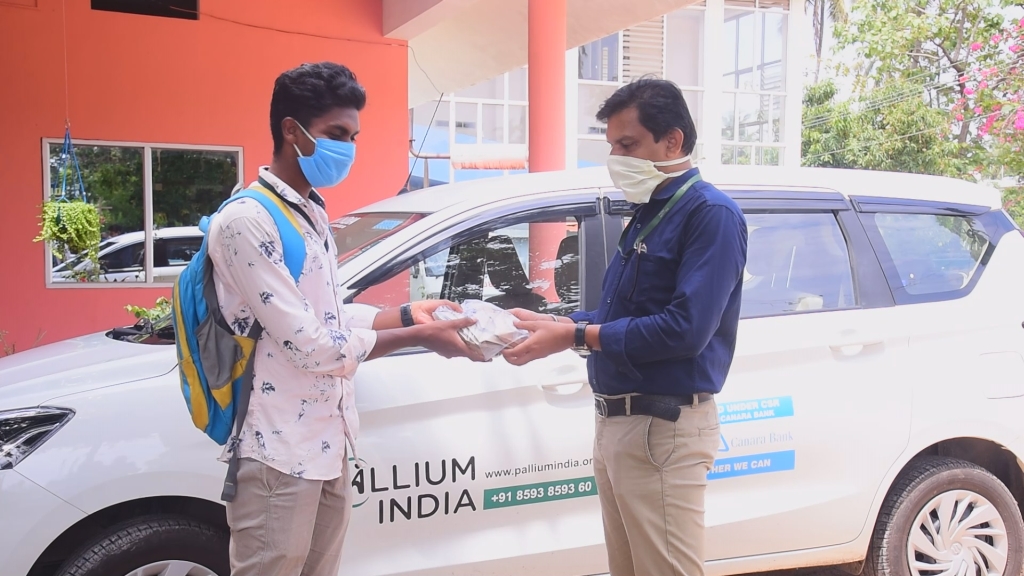How the community helped Pallium India to care for people during the lockdown
Dr Vijesh V V, Pallium India’s Coordinator-National Outreach Programme, writes:
It has been more than four months since the precautionary national lockdown was announced on 24th March to shackle the spread of COVID-19. Despite the stringent quarantine measures and health system preparedness measures undertaken on a war footing, the pandemic rages unabated, causing unprecedented suffering.
As an organisation serving the cohort most vulnerable to COVID-19, the old, frail and the chronically ill, Pallium India is aware of its added responsibility to care for its patients and families in these uncertain times. It was this feeling of collective responsibility amongst staff members that motivated us to remain functional on all days while nearby hospitals and palliative care centres were closing down. However, the lockdown and resultant governance limbo took its toll on the operation of the organisation. Stringent regulations following the national lockdown affected Pallium India’s patient care services in many ways. In-patient, out-patient and home care services had to be significantly scaled back temporarily, and free movement of clinical teams and volunteers were no longer permissible. Nevertheless, we were able to deliver medicines, food kits and other essential consumables to 1400 families at their homes, right before the lockdown was announced, and continue to reach the most vulnerable with the support of its community volunteers even after the lockdown was in place.

More than 80% of the families supported by Pallium India are extremely poor. About 60% of the patients are elderly and many suffer from immensely debilitating diseases with repercussions evident on not just the patient but the whole family. Clearly, home deliveries of essential items were not enough to ease their protracted suffering; they needed regular monitoring and support. In order to remain in regular contact with its beneficiaries, Pallium India operated a helpline service for its registered patients and made sure that the most vulnerable were attended to at the earliest.
Though the organisation was able to put systems in place to reach out to and care for its registered beneficiaries, it could not sit back and do nothing as more and more people around were finding it difficult to access even most basic necessities of life. In early April, one week after national lockdown, Pallium India opened its helpline to the general public. More than a hundred new volunteers joined hands with the organisation to take palliative care to the doorsteps of those who require it the most. About 80 volunteers below the age of 40 sensitised in the basics of palliative care reached out to more than 300 families in Trivandrum and the neighbouring 2 districts. They delivered medicines, food, collected blood samples for laboratory investigation and lent a helping hand whenever necessary.
Restrictions are now being relaxed except for a few pockets of suspected ‘super spread’ and states are considering a staggered exit from the lockdown even though opening state borders have caused a conspicuous increase in identification of new cases. Having operated to full strength through June into early July, Pallium India now operates essential home care services in addition to out-patient and in-patient services as Trivandrum corporation limits remains a containment zone.
A recently published Lancet editorial reported that “a pandemic is a cause and powerful amplifier of suffering, through physical illness and death, through stresses and anxieties, and through financial and social instability”. COVID 19 and the resultant national lockdown have inflicted not just physical suffering, but psychological, emotional, social and spiritual suffering on scores of people.
Dr. Srinath Reddy, President of the Public Health Foundation of India (PHFI) opines in his recent article published in The Hindu ,”Team India and winning the pandemic battle” that young volunteers should be trained in COVID-19 screening as health workers are now increasingly being overwhelmed. He also shares the success stories of volunteer engagement along with health system preparedness from Kerala and Andhra Pradesh. Now, more than ever, it is time for health care systems to welcome the community to be a partner in health care delivery so as to mitigate serious health-related suffering.







Another break through by Pallium India in addressing the suffering caused by the Covid situation. The last we saw was in the aftermath of the Kerala floods in 2019. At a time when the Govt’s efforts were under strain and public health care facilities stretched, the work done by Pallium India is indeed a boon to the suffering patients. This could not have been achieved without the whole hearted support of their staff and the youthful community volunteers whose services are highly laudable for the work that they have done risking their lives. Their work is worthy of emulation by the younger generation. Keep it up and Way to Go, Guys !
– Krishnaraj, volunteer with Pallium India